Trending
Jay McInerney’s city is still bright
The author and his characters have shed their wild ways but not their love for NYC
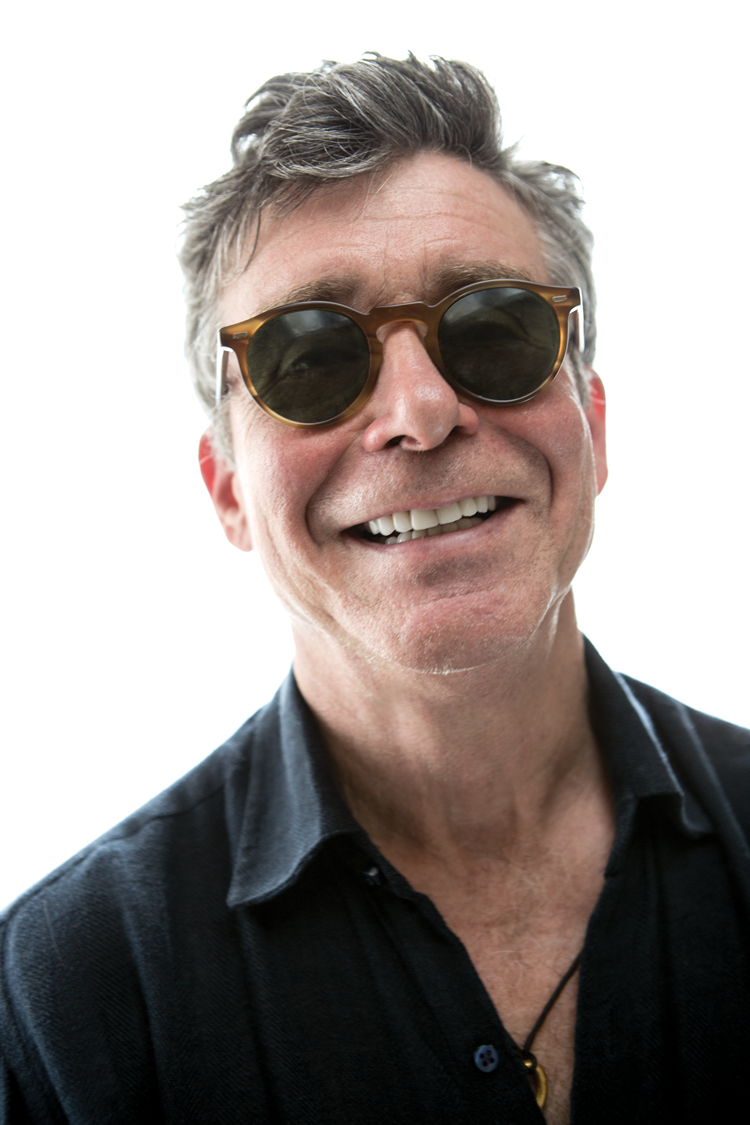
Jay McInerney is hot.
It’s a sweltering day in August, and the author has just returned from his home in Bridgehampton to find that the air-conditioning in his Greenwich Village penthouse is broken. Stale, stuffy air fills the apartment McInerney shares with his wife. On a more comfortable day, it would be the perfect place for perusing the couple’s impressive art collection or admiring the city views from the terrace.
But on this day, it’s too hot to admire anything, so we walk a few blocks to have lunch at Gotham Bar and Grill, where the hostess squeals with excitement when she spots McInerney. “I loved your book!” she says. It’s Restaurant Week, and hordes of hungry would-be diners are waiting for tables. We are seated at the bar immediately.
The scene could fit nicely into of one of McInerney’s novels: a man, inconvenienced by cruel and unpredictable forces, finds salvation — at least temporarily — thanks to his status in New York. New York will always save McInerney and his characters in the end.
Thirty-two years after his first novel, “Bright Lights, Big City,” made him a literary star, McInerney is (once again) on a promotional tour for his latest book, “Bright, Precious Days.” His eighth novel revisits Corrine and Russell Calloway, the glamorous couple he first introduced in his 1992 novel, “Brightness Falls.” They are struggling with — among other things — infidelity, the exorbitant cost of living in New York and an overweight teenage daughter.
“No one talked about food, and we didn’t really
eat that much of it because we were,
you know, doing cocaine.”
Those are very grown-up problems, and though McInerney made his name chronicling the cocaine-sprinkled party scene of the 1980s, he (and his characters) have indeed grown up. “The road of excess leads to rehab, or the boneyard, more often than it leads to the palace of wisdom,” Russell considers at one point, dismissing the notion that being an addict somehow makes you a better artist.
Not that McInerney’s characters don’t have fun, but their fun takes more civilized outlets; dinner parties in secret restaurants replace cocaine binges in nightclubs. “Inevitably, I feel like my characters had to grow older along with me,” McInerney says, “I don’t live the kind of life that I did when I was in my 20s.”
In his 20s — and let’s be honest, for a while after that — McInerney was a fixture on the society circuit, dating models such as Marla Hanson and the actress Rielle Hunter (now best known as the mistress and mother of a child with presidential candidate John Edwards). McInerney was a regular at the Odeon, and his exploits were constantly featured in the tabloids. Drama seemed to follow him around; his second ex-wife attempted suicide when they divorced, and his third wife wrote a book titled “Welcome to Your Facelift,’’ which she publicized by telling everyone that McInerney made her feel old.
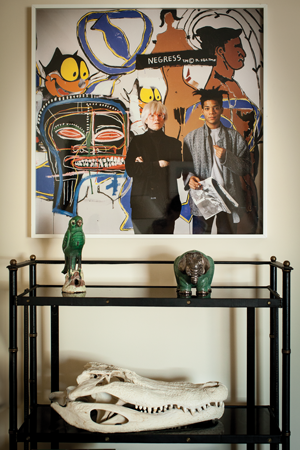
A limited edition photo of Andy Warhol and Jean-Michel Basquiat
He was even honored with a character named after him in Bret Easton Ellis’ 2005 book, “Lunar Park” (a representation McInerney reportedly did not much appreciate).
McInerney has often said that a large part of why he engaged in such wild antics was that everyone expected him to act like the protagonist of “Bright Lights, Big City” — and so he did. “I became that figure that media wanted me to be,” McInerney told the New York Times in 2006, right before the publication of his second Russell and Corrine novel, “The Good Life.”
Today, his life is a much more settled one. He has been married to his fourth wife, Anne Hearst (yes, those Hearsts — she is the sister of Patty) for nearly 10 years. He regularly visits his children, 20-year-old twins, and their mother, wife number three, Helen Bransford, in Nashville. He declines a glass of wine at lunch because he has interviews scheduled for the afternoon. He is, in short, rather responsible now.
“You can’t do everything,” he says after passing on dessert. “It’s something I eventually learned. It took me about 20 or 25 years.”
Not that he doesn’t miss the old days. The characters in “Bright, Precious Days” spend much of their time reminiscing about their youth and the city of their youth, when Soho lofts were actually filled with artists and they stayed up all night roaming the deserted Downtown streets.
Nostalgia, though, is a complicated emotion and McInerney acknowledges that much of what he remembers of the city in the ‘80s may be romanticized.
“You have to be careful as you get older about not just assuming that everything in your youth was better. I mean, maybe part of it is you have a backache and you’re cranky because you couldn’t sleep the night before and you’re irritated that the 20-year-olds still seem to be having fun.”
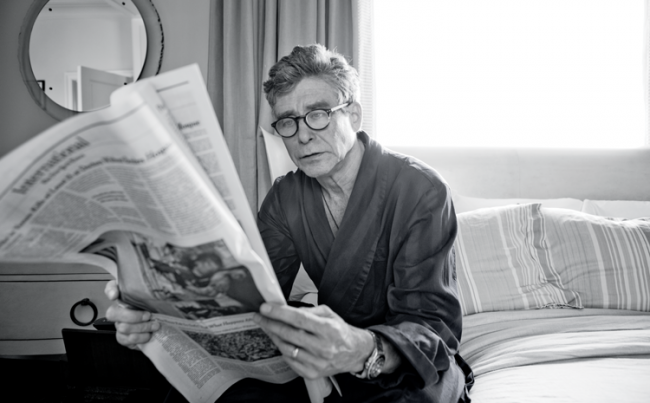
Jay McInerney
In certain respects, McInerney appreciates the mature turn the city has taken, and his own interest in food and wine culture reflects that. “When I came here, there was no foodie culture, no celebrity chefs, no one talked about food, and we didn’t really eat that much of it because we were, you know, doing cocaine. It suppresses the appetite,” he says between bites of a buttered roll. “Cocaine and vodka, I mean there’s only so much you can say about them and that culture.”
McInerney writes a column on wine in Town & Country magazine, covering everything from the resurgence of rosé in popular culture to posing as a sommelier for an evening. “I thought it would be pretty easy, but nooo,” he says with a laugh. “It’s good to be on the other side of the service economy for a while to remember how hard it is.”
Before McInerney became a world-famous author at the age of 29, he worked a series of jobs as a busboy, waiter and bartender. He was a fact-checker at the New Yorker until he was fired for getting facts wrong in a piece about the French elections. He went on to get a master’s degree in writing from Syracuse where he studied under Raymond Carver.
And then, in six weeks, he wrote “Bright Lights” and everything changed. “‘Bright Lights’ was like this mega-event. For a number of years, it sort of loomed large in the cultural landscape and it was sort of hard to live down,” he says.
“Inevitably, I feel like my characters had
to grow older along with me.”
He believes that the rampant success of the book influenced the less-than-favorable reviews of his next two books, “Ransom” and “Story of My Life.”
“There was a certain strain of resentment, I think, about the success of the book and the high profile that it gave me. I think some people got distracted by that,” he says.
Reviews of “Bright, Precious Days,” thankfully, have been much more favorable; in her review in the New York Times, Janet Maslin even asked McInerney directly to “please write” a fourth installment of the series.
Due in part to the positive response, McInerney says he will “probably” respond to Maslin’s request and take up Russell and Corrine’s story again. This time, though, the couple will have been priced out of their rental in Tribeca — a too-real scenario for a lot of people like the Calloways, who find themselves pushed out of the neighborhoods they once made cool.
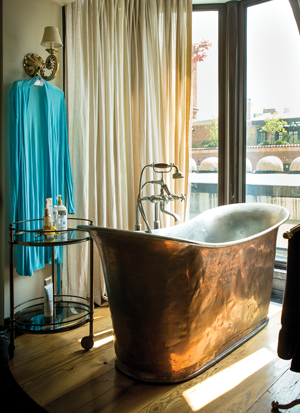
A 19th-century French bathtub
“What does Manhattan even signify anymore?” Corrine asks Russell when he stubbornly insists on trying to remain in their loft, which their family of four finds cramped. “It’s an island of wealthy people shopping in the same stores you can find in San Francisco and London and Dubai. Look around you, Russell. Look at the shiny condos going up all around us, crowding out the middle class and your old bohemians, blocking out the sunlight.”
McInerney himself struggles with what the city has become, and yet he doesn’t see himself living anywhere else. “There’s stuff wrong with New York, and a lot of the change has not been for the better necessarily, but I can’t imagine where else I’d go. Cleveland? Detroit? Pittsburgh?” He shudders. “I don’t think so.”
“I go to dinner parties with a ballet dancer, a hedge fund manager, an architect, an actor, a painter. That’s a really typical night in my world. And I can’t think of anywhere else you could do that,” he explains. “New York is the place where all the ambitious people tend to go, and it’s fun to be among them. And write about them, even if you’re making fun of them. A lot of them are ridiculous, but that’s good fodder for a novelist.”
The one change that might prompt McInerney to move? A Donald Trump presidency, which he says might inspire him to leave the country.
“I think he’s a selfish bastard,” McInerney says. He has met Trump a few times over the years and says he “thought he was pretty egregious then. But at least he was contained to Atlantic City and basically the Upper East Side. Now he’s become a national menace.”
On the other hand, Donald Trump in the White House might make a perfect setting for the next installment of Russell and Corrine Calloway’s story, which McInerney returns to when the city is in distress; “Brightness Falls” is set during the panic of 1987; “The Good Life” set in the aftermath of 9/11; and now “Bright, Precious Days” takes place during the recession in 2008. The major events provide a dramatic backdrop to Corrine and Russell’s more everyday feelings and struggles, turning small moments like cooking family dinner into significant events.
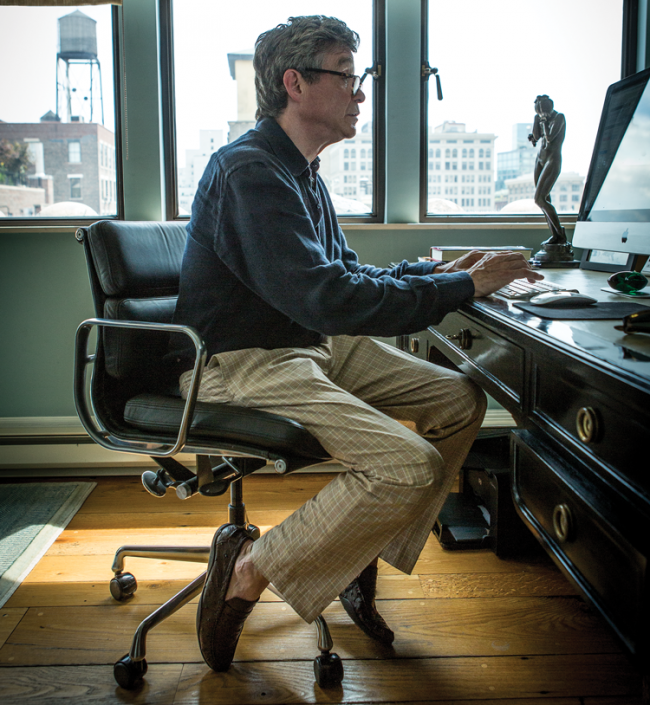
The author in his office
Speaking of small grievances, by the end of lunch, McInerney still doesn’t know when his AC will be fixed. His super hasn’t gotten back to him, and glumly he scrolls through a list of rooms at the Bowery and Marlton hotels that his assistant has emailed him, trying to find a suitable place to spend the night. I wish him good luck as we set off down the sweltering street on our different paths.
Even for Jay McInerney, it seems, some days are not so bright and precious. But at least in New York City, there are always options.




